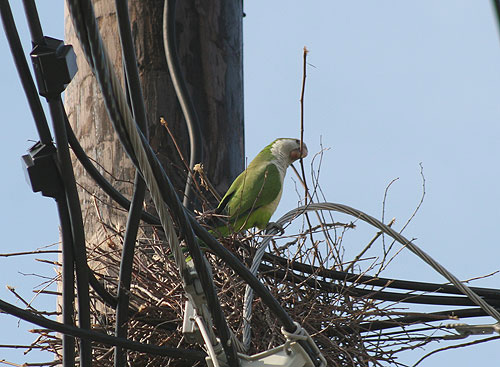By adamg on Sun., 4/4/2010 - 12:56 pm 

George Cumming photographs the pair of monk parakeets that showed up last fall and survived the winter:
... Now they are back and they are nesting on Bremen St. not far from the Y. This is truly better than chocolate Easter bunnies. They are very vocal and fallen nesting material is strewn all over the sidewalk beneath. It is just amazing to watch these birds while lots of people walk past on their way to the Airport T station. ...
Copyright George Cumming. Posted in the Universal Hub pool on Flickr.
Topics:
Neighborhoods:
Like the job UHub is doing? Consider a contribution. Thanks!
Ad: